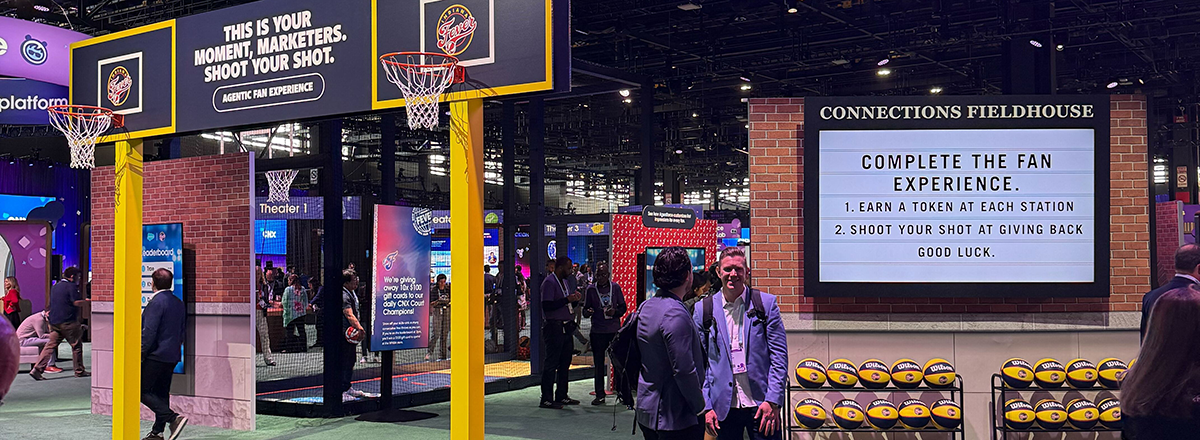
Connections 2025: Agentic Marketing and Commerce Are Here to Stay
Lauren OlsonCEO Steve Pruden, VP of Alliances Derek Neff, Enterprise AE Jarrod Kingston, and Client Director Jimmy Sharp all contributed to this article.
When you tagline an event as “Where marketers and AI agents connect,” then AI is, of course, going to be front and center. That wasn’t a surprise. And there’s plenty to get to on that front.
But don’t think that was the sole focus of last week’s Salesforce Connections conference in Chicago. The two days were filled with announcements and trends that provide a clear sense of where we’re headed.
Interestingly, several of the major topics that stuck out to us were also ones that we heard coming out of the COVID-19 pandemic – for example, loyalty and how to deliver experiences that engender it came up time and again – showing that while so much can change in a few years, some challenges have remained the same.
Retailers Get a Lift
While Connections caters to companies of all organizations, retailers had to be leaving feeling extra excited about the future with Salesforce. Salesforce showed that it is serious about making integration and scale easier for brands in retail.
That was on display as Salesforce announced its new retailer software bundles, where companies can pick from two options that simplify licensing and give them all of the Salesforce platforms and apps needed for cohesive success. One of these two bundles is marketed as a “complete Unified Commerce solution.” Speaking of…
The Return(?) of Unified Commerce
Unified commerce is one of those themes that I mentioned at the top has been around for a while and came back up to the forefront at CNX. As detailed in the Commerce Cloud keynote, Salesforce is using the term for the bringing together of three of its products – Commerce Cloud, OMS, and POS (point of sale) – to allow brands to scale in a streamlined way that can’t be done on Shopify (without a ton of plug-ins and work). As Eric Lessard of Salesforce put it, not only are those three tools essential for delivering great customer experiences, but also “this means faster time to value and lower total cost of ownership.”
Agentic commerce was also a big talking point, with the rollout of new shopping agent skills for product discovery, checkout, and more. We’re still in the early stages of agentic commerce, but it’s clear that it’s here to stay. What’s unclear still is how buyers want to engage with agents through ecommerce sites, compared to other third-party LLM (large language model) tools. But Salesforce’s scale and relationships with the likes of Google, AWS, and OpenAI should allow customers to future-proof their AI solutions.
Cohesive Data and Marketing Cloud Next
Another topic that harkens back to a few years ago is that companies – especially those who are B2B2C – are struggling to creatively and successfully gather, manage, and centralize first-party data to market effectively. Speed and personalization of content creation is paramount, and something we heard time and again was the need for more personalized messaging and experiences.
Data Cloud is still the best option for brands looking to bring multiple data sources together for better cleanliness and centralization. But from the content and activation side, Marketing Cloud received a ton of buzz at CNX thanks to the news of Marketing Cloud Next. The idea is that Marketing Cloud Next spans customer intelligence, orchestration, advertising, personalization, and marketing operations, but that its power is in its ability to leverage AI agents for better experiences.
The tie-in with Agentforce was a major focus with Marketing Cloud Next, and “agentic marketing” was arguably the word of the conference. The concept is that autonomous AI agents can connect and personalize customers’ experiences across touchpoints, handling the execution while your marketing team focuses on the strategy. The goal is to predict customer behavior, deliver a personalized experience, and make marketing campaigns more automated.
The Bottom Line
All of these strategies, tools, and tactics discussed so far serve a purpose we heard time and again: to help companies transform their ways of working to prove ROI by providing faster time to value and quickly bringing use cases to life.
Reach out to learn more about any of these new solutions, how to best apply Salesforce tools to your business, or how to better understand next steps with a free and quick workshop. No one is more excited about the prospect of putting these new approaches into action than we are.

Lauren Olson
Lauren Olson is the Executive Vice President of Marketing at Studio Science where she drives the brand, voice, and perspective of the consultancy and how it engages with key audiences. Lauren has more than 15 years of experience building brands and engaging audiences.


